Roku Bundle
Who Really Calls the Shots at Roku?
Ever wondered who steers the ship at one of the leading streaming platforms? Understanding the Roku SWOT Analysis and its ownership is key to grasping its strategic moves and market position. From its humble beginnings to its current status, Roku's journey is a fascinating study in corporate evolution. Knowing the Roku parent company and its major shareholders unveils the forces that shape its future.
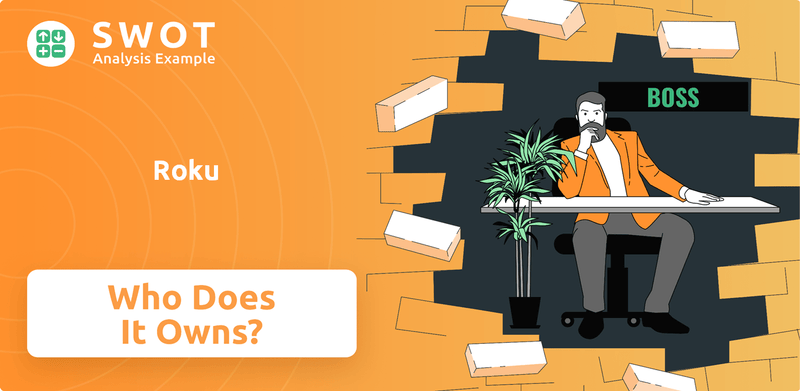
This deep dive into Roku ownership examines the Roku company history, from its founding by Anthony Wood in 2002 to its current publicly traded status. We'll explore the evolution of Roku stock and the influence of its key investors, providing insights into how these factors impact its business model and strategic direction. Discover who are Roku's major shareholders and how they influence the company's decisions, ultimately impacting its current valuation and its ability to compete in the dynamic streaming landscape.
Who Founded Roku?
The story of the company begins with Anthony Wood, the founder of the streaming platform. Wood, a seasoned entrepreneur, established the company after gaining experience in digital video recording with his previous venture, ReplayTV. His vision for a dedicated streaming device was born from his time at Netflix, where he led the development of the Netflix Player.
At the outset, the ownership structure of the company was largely concentrated with Wood. The exact equity splits at the company's inception are not publicly available. However, it is typical for founders like Wood to hold a substantial majority stake in the early phases of a tech startup. This concentration of ownership is common as founders often retain control to guide the company's initial direction and growth.
Early support for the company came from various sources, including Netflix. Netflix was an early investor and partner, initially planning to use the company's device as its primary hardware for streaming content. This early collaboration was crucial, providing capital and strategic validation. Other early backers would have included angel investors and potentially venture capital firms in subsequent seed or Series A funding rounds, although the exact breakdown of these initial smaller stakes is not readily available in public records.
Anthony Wood founded the company, with initial ownership primarily held by him. Netflix was an early investor and partner, providing crucial early support for the streaming platform.
Early agreements would have included standard startup provisions, such as vesting schedules for founder shares. Buy-sell clauses were also typical, governing the transfer of shares among founders and early investors.
The founding team's vision for an open streaming platform was central to the distribution of control, even as Netflix held an early stake. There were no widely reported initial ownership disputes or buyouts that significantly altered the foundational ownership structure prior to later funding rounds.
Early funding rounds likely included investments from angel investors and venture capital firms. The exact details of these investments are not always public, but they were crucial for the company's early growth.
The partnership with Netflix was a key strategic move, providing both financial and strategic support. This early collaboration helped validate the company's business model and technology.
There were no widely reported initial ownership disputes or buyouts that significantly altered the foundational ownership structure prior to later funding rounds.
Early agreements would have included standard startup provisions. These typically include vesting schedules for founder shares to ensure commitment to the company's long-term success. Buy-sell clauses are also typical, governing the transfer of shares among founders and early investors. The founding team's vision for an open streaming platform, independent of any single content provider, was central to the distribution of control, even as Netflix held an early stake. For further insights into the competitive landscape, you can explore the Competitors Landscape of Roku.
Roku SWOT Analysis
- Complete SWOT Breakdown
- Fully Customizable
- Editable in Excel & Word
- Professional Formatting
- Investor-Ready Format
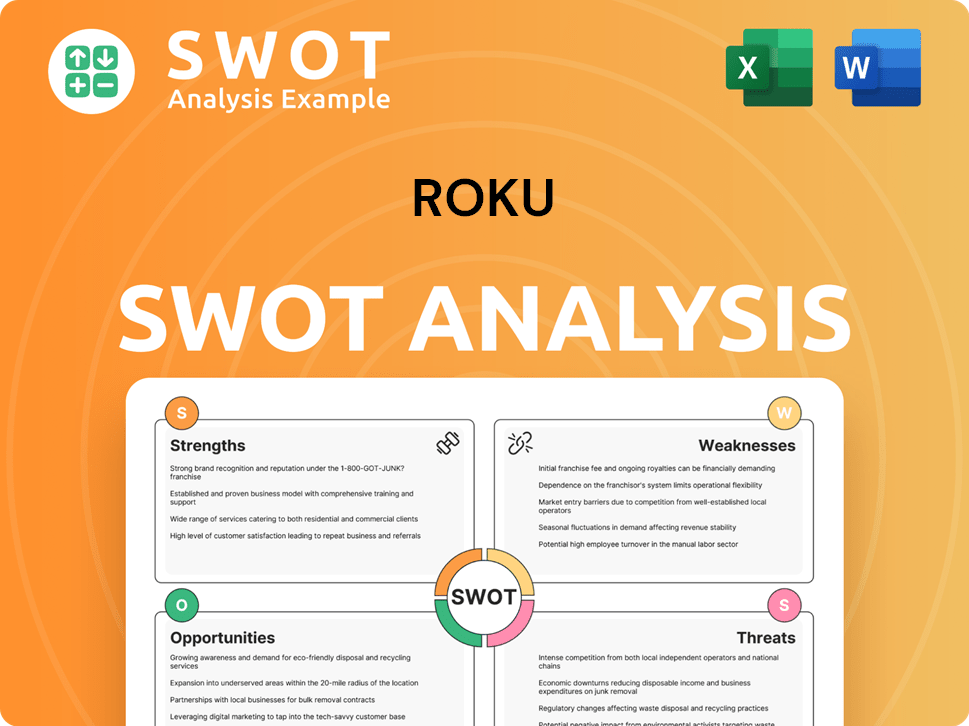
How Has Roku’s Ownership Changed Over Time?
The evolution of Roku ownership has been a key part of its journey. Initially a private company, it transformed significantly when it became a publicly traded entity. The initial public offering (IPO) on September 28, 2017, marked a pivotal moment, allowing the company to raise capital and broaden its investor base. This transition from private to public ownership has shaped its strategic direction and financial performance.
The IPO, priced at $14 per share, gave Roku an initial market capitalization of roughly $1.3 billion. This event was a major step in Roku's company history, opening doors to new investment opportunities and increased visibility in the market. Since then, the ownership structure has continued to evolve, with institutional investors gaining a larger role.
| Event | Date | Impact on Ownership |
|---|---|---|
| Initial Public Offering (IPO) | September 28, 2017 | Transitioned from private to public ownership, increased investor base. |
| Institutional Investment Growth | Ongoing | Increased influence of institutional investors like The Vanguard Group and BlackRock Inc. |
| Founder's Continued Control | Ongoing | Anthony Wood retains significant voting control through dual-class shares. |
As of the first quarter of 2024, institutional investors held approximately 75.31% of Roku's outstanding shares. Key players include The Vanguard Group Inc., which held 11.23% as of March 30, 2024, and BlackRock Inc., with 6.27% of the shares. Roku investors also include Fidelity Management & Research Co. LLC, ARK Investment Management LLC, and Morgan Stanley. Furthermore, Anthony Wood, the founder and CEO, maintains a significant stake, holding 13.9% of Class A shares and 99.8% of Class B shares as of December 31, 2023. This structure allows him to maintain substantial control, influencing the company's long-term strategy. Learn more about the Growth Strategy of Roku.
The ownership of Roku has evolved significantly since its IPO in 2017, with institutional investors now holding a majority stake.
- Institutional investors hold approximately 75.31% of shares as of Q1 2024.
- Anthony Wood, the founder, retains significant voting control through a dual-class share structure.
- The shift to public ownership has brought increased scrutiny and pressure for financial performance.
- Major institutional holders include The Vanguard Group and BlackRock Inc.
Roku PESTLE Analysis
- Covers All 6 PESTLE Categories
- No Research Needed – Save Hours of Work
- Built by Experts, Trusted by Consultants
- Instant Download, Ready to Use
- 100% Editable, Fully Customizable
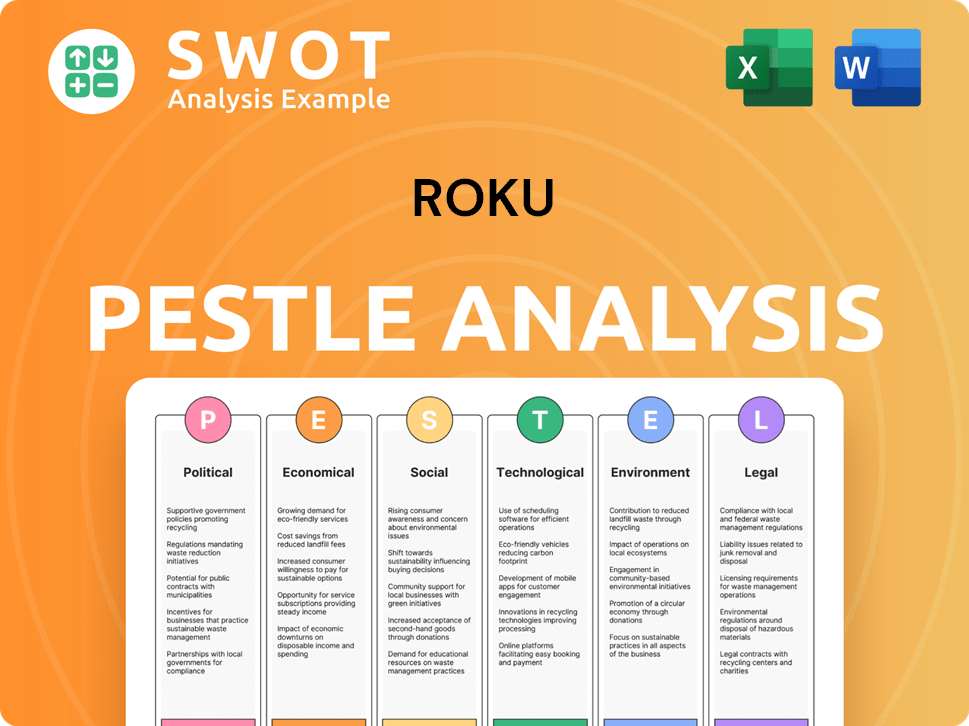
Who Sits on Roku’s Board?
The current Board of Directors at the company plays a vital role in its governance. As of early 2025, the board includes Anthony Wood, who serves as Chairman and CEO. Other board members include independent directors and those with backgrounds in technology, media, and finance. The board's composition balances various stakeholder perspectives, including major shareholder representation and independent expertise. Understanding the board's structure is crucial for anyone looking into Roku ownership and its strategic direction.
The board's composition reflects a balance of interests, with the founder, Anthony Wood, holding a significant position. The presence of independent directors ensures a degree of oversight and diverse perspectives. The structure is designed to align with the company's long-term vision, influencing Roku investors and the overall strategic direction. The board's decisions are critical in shaping the company's future, making it a key factor in understanding who owns Roku.
| Board Member | Title | Key Role |
|---|---|---|
| Anthony Wood | Chairman and CEO | Founder, significant voting power |
| [Independent Director Name] | Independent Director | Oversight, diverse perspectives |
| [Independent Director Name] | Independent Director | Oversight, diverse perspectives |
The company utilizes a dual-class share structure, which significantly affects its voting power. This structure includes Class A and Class B common stock. Class A shares have one vote each, while Class B shares have ten votes each. Anthony Wood holds a substantial portion of the Class B shares, giving him considerable control. This structure influences the company's decision-making process, impacting Roku's current valuation and the influence of Roku's major shareholders. The dual-class structure is a key aspect of the Roku ownership structure.
The Board of Directors is led by the founder, Anthony Wood, ensuring founder influence.
- Dual-class share structure grants Wood significant voting power.
- Independent directors provide oversight and diverse perspectives.
- This structure impacts who controls Roku's board of directors.
- Learn more about the Marketing Strategy of Roku.
Roku Business Model Canvas
- Complete 9-Block Business Model Canvas
- Effortlessly Communicate Your Business Strategy
- Investor-Ready BMC Format
- 100% Editable and Customizable
- Clear and Structured Layout
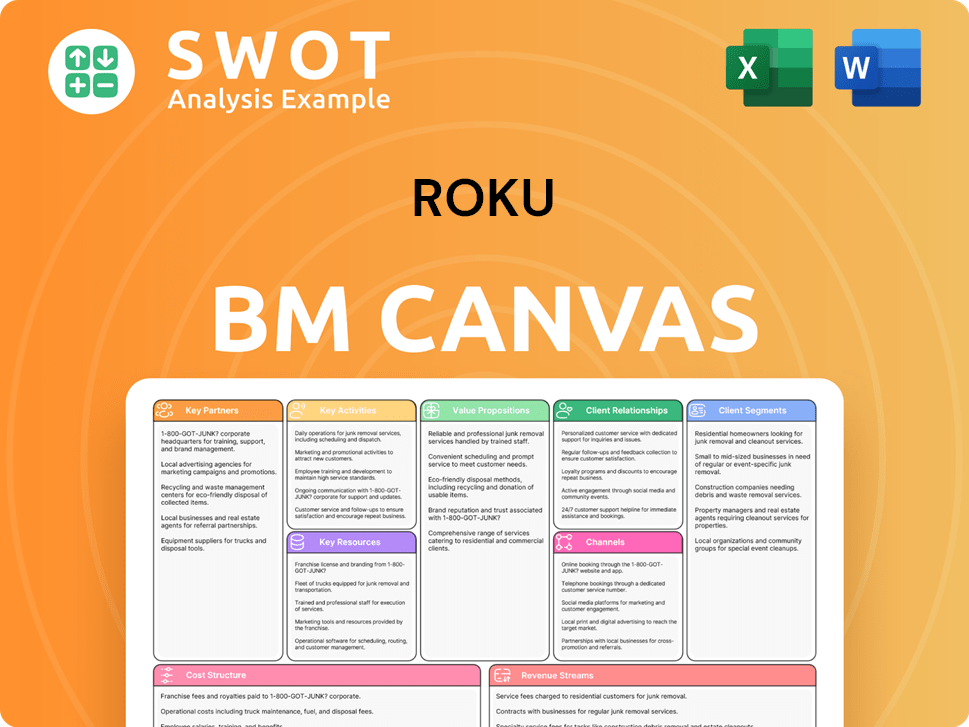
What Recent Changes Have Shaped Roku’s Ownership Landscape?
In the past few years (2022-2025), the Roku ownership structure has seen ongoing shifts, mainly due to market dynamics and strategic moves. There haven't been major share buybacks that significantly altered the overall ownership structure. The company has used standard equity compensation plans, which can slightly dilute existing shareholders over time. In terms of mergers and acquisitions, the company has focused on smaller, strategic acquisitions to enhance its platform and advertising capabilities, rather than large-scale mergers that would drastically change its ownership.
Roku's acquisitions, such as the dataxu demand-side platform in 2020 and the Nielsen Advanced Video Advertising business in 2021, were primarily asset or technology acquisitions. These did not involve full company takeovers that would impact its core ownership. Leadership has remained stable, with Anthony Wood still at the helm. Industry trends, like increased institutional ownership, continue, with large asset managers adjusting their stakes based on market performance.
| Metric | Details | Data (Approximate) |
|---|---|---|
| Market Capitalization | Current valuation of the company | Fluctuates, check recent market data |
| Institutional Ownership | Percentage of shares held by institutional investors | Typically a significant percentage, check recent filings |
| Founder's Ownership | Percentage of shares held by the founder, Anthony Wood | Significant, check recent filings |
Founder dilution is a natural part of fundraising and public offerings. However, Anthony Wood's continued control through Class B shares ensures his vision remains central to Roku's strategy. There haven't been public statements about a planned founder succession that would change the current voting power structure soon. Also, there haven't been significant discussions about privatization or a major public listing change. The company's ownership trends reflect a maturing public company with a stable, founder-led governance structure. To learn more about the company's background, you can read a Brief History of Roku.
Major shareholders include institutional investors and the founder, Anthony Wood. Institutional ownership often represents a significant portion of the shares.
Roku stock performance is subject to market conditions and company-specific news. Investors should monitor the stock's performance and related financial data.
Roku competes in the streaming market. Its market position and valuation depend on its ability to innovate and gain market share.
The future of Roku depends on its ability to adapt to changing consumer preferences and technological advancements. The company's strategic decisions will influence its long-term success.
Roku Porter's Five Forces Analysis
- Covers All 5 Competitive Forces in Detail
- Structured for Consultants, Students, and Founders
- 100% Editable in Microsoft Word & Excel
- Instant Digital Download – Use Immediately
- Compatible with Mac & PC – Fully Unlocked
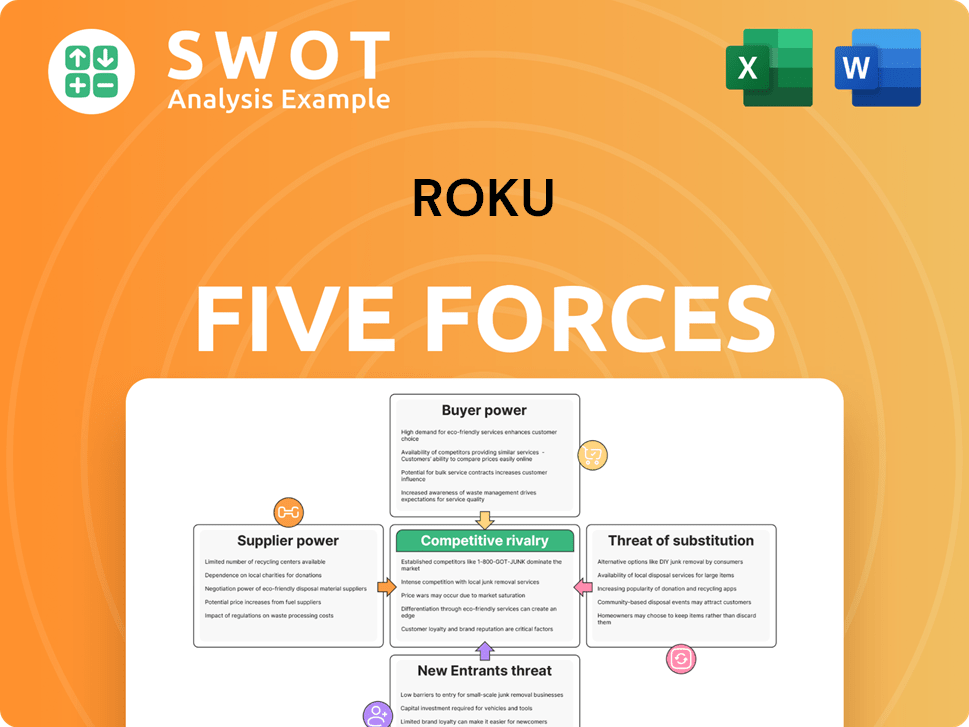
Related Blogs
- What are Mission Vision & Core Values of Roku Company?
- What is Competitive Landscape of Roku Company?
- What is Growth Strategy and Future Prospects of Roku Company?
- How Does Roku Company Work?
- What is Sales and Marketing Strategy of Roku Company?
- What is Brief History of Roku Company?
- What is Customer Demographics and Target Market of Roku Company?
Disclaimer
All information, articles, and product details provided on this website are for general informational and educational purposes only. We do not claim any ownership over, nor do we intend to infringe upon, any trademarks, copyrights, logos, brand names, or other intellectual property mentioned or depicted on this site. Such intellectual property remains the property of its respective owners, and any references here are made solely for identification or informational purposes, without implying any affiliation, endorsement, or partnership.
We make no representations or warranties, express or implied, regarding the accuracy, completeness, or suitability of any content or products presented. Nothing on this website should be construed as legal, tax, investment, financial, medical, or other professional advice. In addition, no part of this site—including articles or product references—constitutes a solicitation, recommendation, endorsement, advertisement, or offer to buy or sell any securities, franchises, or other financial instruments, particularly in jurisdictions where such activity would be unlawful.
All content is of a general nature and may not address the specific circumstances of any individual or entity. It is not a substitute for professional advice or services. Any actions you take based on the information provided here are strictly at your own risk. You accept full responsibility for any decisions or outcomes arising from your use of this website and agree to release us from any liability in connection with your use of, or reliance upon, the content or products found herein.